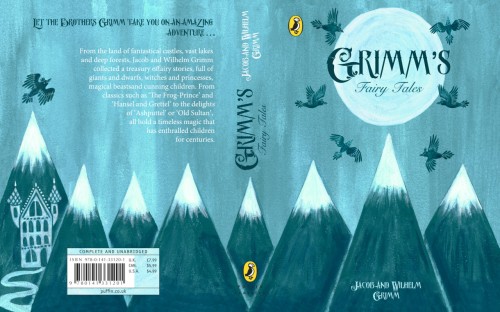
“The Ungrateful Son”, from the brothers Grimm, found in Lewis Hyde’s The Gift:
Once a man and his wife were sitting outside the front door with a roast chicken before them which they were going to eat between them. Then the man saw his old father coming along and quickly took the chicken and hid it, for he begrudged him any of it. The old man came, had a drink, and went away.
Now the son was about to put the roast chicken back on the table, but when he reached for it, it had turned into a big toad that jumped in his face and stayed there and didn’t go away again.
And if anybody tried to take it away, it would give them a poisonous look, as if about to jump in their faces, so that no one dared touch it. And the ungrateful son had to feed the toad every day, otherwise it would eat part of his face. And thus he went ceaselessly hither and yon about the world.
Well, the brothers Grimm could preach the Law as well as anyone. A few bullet points by way of analysis:
-The parent-child relationship is the simplest and most fundamental arena for ingratitude, because we owe existence itself to our parents. It immediately recalls the analogy of God as Father, whom we, as children, desert in our desire for self-sufficiency.
-Self-sufficiency, and a corresponding rejection of indebtedness, appears in our desire to possess things. The story of Orpheus and Eurydice gets at the same point: when Orpheus goes to find his deceased love in the underworld, she is allowed to return to him one condition: he cannot look back. Of course, we know he will look back; he wouldn’t be in the underworld at all if he weren’t possessive. This suggests another point,
-The need to possess something denies our dependency. Chicken works here because food is the ultimate example of dependence, and eating together is a primal symbol of community because it enacts shared dependence. In hoarding the chicken, as in his ingratitude, the man rejects dependence, becomes self-sufficient.
-Of course, the desire for possession, with its corresponding rejection of dependence, ironically manifests our need, thus the symbol of the insatiable toad on the man’s face. The toad represents, among other things, his own insatiability, which is burden and must always be fed.
-Other people cannot help him; his avarice is here to stay.
-And finally, the Grimms evoke a little slice of Eden. Ingratitude based on coveting food for self-sufficiency, and then that self-sufficiency becomes a curse: you want to fulfill yourself? – go ahead. We’re all walking around with toads, in a sense, condemned to all sorts of harmful actions, habits, and thoughts to feed our fragile and needy egos. And the exile from home, the wandering in search of fulfillment, is especially reminiscent of Genesis.
The Grimms offer little hope, only a small clue: “if anybody tried to take it away, it would give them a poisonous look, as if about to jump in their faces, so that no one dared touch it.” There is a cure: our problems require someone else to bear them, to take them on, but no one is willing to, not fully or effectively. He wanders, presumably searching for an end to the pain, someone who will try to remove the toad, even if it attaches to their faces next. We can guess he won’t find it – it seems even his wife wouldn’t help him – but there’s slight hope. His father wandered toward him and sought him out once before, and a father’s kind of love, if the man is lucky enough, may even be willing to remove the toad at his own cost.
All of this is getting a tad ridiculous – we can stick with the Grimms’ wonderfully descriptive (though utterly bizarre) tale of law for now, and hope someone will have the guts to fight the toad, even if it means they give their liberty in place of ours.

COMMENTS
Leave a Reply













